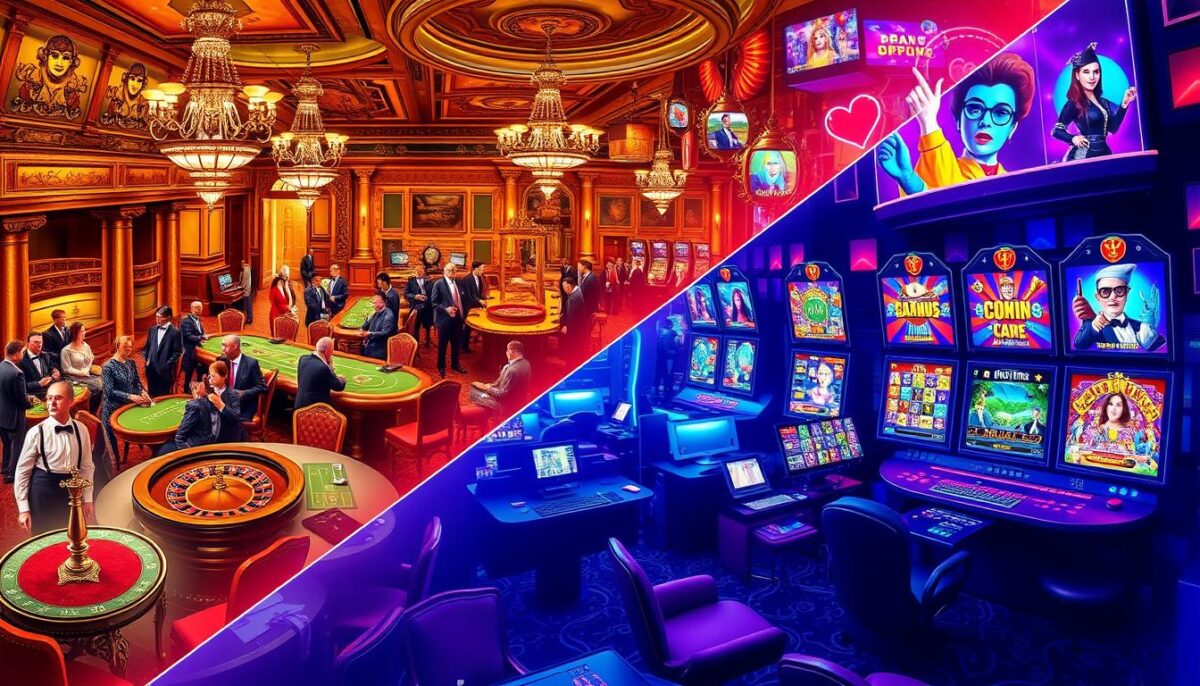As we explore the fascinating evolution of gambling, we find ourselves reflecting on how this age-old practice has transformed over time. The journey from traditional casinos to the dynamic world of online gaming showcases more than just a change in location; it highlights the significant shifts in culture, technology, and consumer behavior. Understanding this gambling history enables us to appreciate the innovations that have shaped today’s gambling trends.
Traditional casinos offered a unique social environment, where the thrill of chance attracted players from all walks of life. However, the rise of technological advancements has made online gaming accessible to many, reshaping how we engage with our favorite games. As we navigate this evolution, it is essential to recognize how these changes not only enhance our gaming experiences but also redefine the landscape of gambling as a whole.
The Fascinating History of Traditional Casinos
Exploring the history of gambling reveals a captivating journey back to ancient civilizations. In these early societies, gambling was often intertwined with religious beliefs and social practices, serving essential functions beyond mere entertainment.
The Origins of Gambling
The origins of gambling can be traced back to ancient cultures, with evidence suggesting its presence in places like China, Greece, and Rome. In China, the earliest forms of gambling featured dice and various games of chance that fascinated participants. The Greeks enjoyed betting on athletic competitions, showcasing an early form of organized gambling. Similarly, the Romans integrated gambling into their social activities, often indulging in games like dice and betting on chariot races.
As we moved toward the 17th century, traditional casinos began to emerge in Europe. The first establishments opened in Venice, providing structured environments for individuals to engage in games of chance. This marked a significant moment in the history of gambling, as these venues laid the groundwork for modern gambling culture.
Cultural Significance of Casinos in Society
The social role of casinos has evolved significantly throughout history. They became more than places to gamble; traditional casinos transformed into vibrant social hubs where communities gathered. In many regions, they fostered relationships, serving as venues for social exchanges and local events.
- Casinos contribute to local economies through tourism and job creation.
- They often host community events, bringing people together around shared experiences.
- Casinos incorporate dining and entertainment options, enhancing their appeal as social venues.
The cultural significance of these spaces is evident in their ability to create a sense of belonging for individuals while preserving the history of gambling within their walls. We witness the intertwining of history and culture through the rich tapestry of traditional casinos.
| Civilization | Gambling Practices | Significance |
|---|---|---|
| China | Dice games and betting | Religious and social significance |
| Greece | Betting on athletic competitions | Promotion of physical prowess |
| Rome | Dice games and chariot races | Social bonding and local entertainment |
| Europe (17th century) | Formation of traditional casinos | Establishment of structured gambling venues |
The Evolution of Gambling: From Traditional Casinos to Online Gaming
The transformation of gambling from traditional brick-and-mortar casinos to vibrant online gambling platforms has been nothing short of revolutionary. As technology progresses, we witness a significant shift in how people engage with gambling, breaking down barriers and providing access at our fingertips. Platforms like PokerStars and various sports betting sites have emerged, allowing us to enjoy our favorite games anytime and anywhere through mobile gaming.
The Rise of Online Gambling Platforms
Online gambling platforms have gained immense popularity over the past two decades, redefining what it means to gamble. With just a few clicks, players can access a wide range of games from digital casinos, including slots, poker, and live dealer options. This shift not only enhances accessibility but also creates new revenue streams for operators. The regulatory landscape continues to evolve, ensuring a safer gaming environment while encouraging innovation in the field.
Technological Advancements and Their Impact on Gaming
The impact of technology in gambling cannot be overstated. Advancements, such as virtual reality and artificial intelligence, continue to transform our gaming experiences. These innovations allow for immersive environments where players can interact with the game and fellow participants on a whole new level. The future of online gaming looks bright as further enhancements in mobile gaming and digital casino offerings promise to attract even more participants.
| Technology | Impact on Gambling |
|---|---|
| Virtual Reality | Provides immersive gaming experiences, simulating a physical casino environment. |
| Artificial Intelligence | Enhances personalization and customer support, creating tailored experiences for players. |
| Mobile Gaming | Enables players to engage with gambling anytime, accelerating the growth of online platforms. |
| Blockchain Technology | Offers transparency and security, improving trust in online gambling transactions. |
The Future of Gambling: Trends and Innovations
As we look ahead to the future of gambling, it is clear that the industry is on the brink of significant transformation. Current gambling trends such as the integration of blockchain technology in gaming are enhancing security and transparency, adding a new layer of trust for players. This innovative approach not only protects user data but also ensures fair play, fostering a more authentic gaming experience.
Furthermore, we are witnessing a surge in the popularity of live dealer games, which seamlessly blend the convenience of online gaming with the genuine atmosphere of brick-and-mortar casinos. This innovation allows players to interact with real dealers in real-time, creating an immersive experience that resonates with seasoned gamblers and newcomers alike. As technology evolves, these games will likely expand, providing even more diverse gaming experiences.
Additionally, we cannot overlook the rising interest in esports betting and gamification trends that attract a younger audience. By integrating elements of gaming into traditional betting formats, we are creating engaging experiences that resonate with a tech-savvy generation. As we prepare for what lies ahead, adaptability will be key for stakeholders in the gambling sector, ensuring we remain relevant in a landscape of rapid change and innovation.



